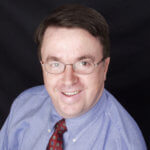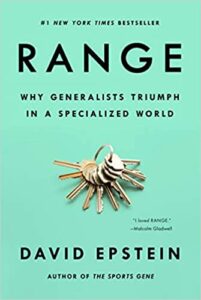Book Review by Andy Ghillyer
Ever since Malcolm Gladwell proposed his 10,000-hour rule in Outliers, the new benchmark for future success has become an investment of 20 hours of deliberate practice every week for 10 years.
In his new book Range: Why Generalists Triumph in a Specialized World, author and journalist David Epstein presents a contrarian argument that specialization should be the exception rather than the rule.
Jack of All Trades, Master of None
The notion of a person having the experience and versatility to tackle many things used to be considered a compliment. Epstein argues that from the days of Tiger Woods being able to use a golf club before he could speak and having his future mapped-out for him by his father, the value of versatility has been overlooked.
Consider the near-fanatical commitment of parents like Earl Woods or Lazlo Polgar (who was determined that at least one of his three daughters would become World Chess Champion and started training them at three years old). Such dedication creates a construct that there is only a finite window of opportunity for your child or mentee to get a head start on the path to success. If there isn’t a firm commitment to a development track by the age of five, the opportunity is lost.
In contrast, Epstein presents compelling research evidence of a documented “fadeout” effect where: “a temporary academic advantage quickly diminished and often completely vanished.” In other words, intense hours of deliberate practice to teach your child to read at three years old may be an impressive achievement, but the other kids will catch-up eventually. The author argues that the skills needed to: “connect contextual clues to understand what they read” – so-called deep learning – will take a lot longer.
Late Developers and Slow Bakers
So, what does this mean for generalists? Has opportunity simply passed them by? Epstein quotes officials and coaches from the Great Britain Summer Olympics team in arguing the exact opposite. They developed a program to encourage adults to try new sports as “late developers,” or “slow bakers,” only to see many of them go on to Olympic success.
The author also presents a fascinating comparative between the highly-driven and laser-focused Tiger Woods and World Champion tennis star Roger Federer. While Earl Woods pushed his son, Federer’s parents pulled their son to explore a wide range of sports, even though his mother was a tennis coach. By the time Federer gave-up his second favorite sport – soccer – in favor of tennis, many of his contemporaries already had years of Woods-like coaching and conditioning under their belts. Surprisingly, none of that mattered.
The attraction of the “Tiger Path” is easy to see. Highly efficient, clear metrics (10,000 hours), with zero distractions. For Epstein and his research data, the greater achievement lies in being willing to experiment, fail, and simply explore without the intense pressure of a pre-destined development path. Range offers detailed research data and a diverse selection of case studies to support the compelling argument that specialization should be the exception rather than the rule.

Andy Ghillyer is a Contributing Writer at Soundview. He lives in Tampa, FL where he specializes in writing for the B2B and academic markets while raising a growing menagerie of cats and dogs.
Soundview subscribers get 15-minute summaries of the key concepts in best-selling business books (like Range) delivered to them every week! Take your career to new heights by staying up-to-date with the trends and ideas affecting business leaders around the globe. Sign up for a free trial now.





